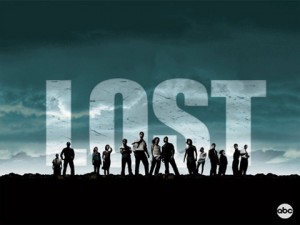Last week, I argued both that Lost was Gothic in its inversion of colonial power structures, and that this inversion was written to be relevant in our globalized 21st century society. Today I’ll take on the use of the supernatural in Lost, and make a parallel argument: the use of the supernatural in Lost is Gothic, and this use of the supernatural is also relevant in the 21st century.
Some Gothic literature relies on the supernatural and some does not. Both strains, however, lean heavily on the weight of past deeds and misdeeds. They give the question of legacy and inheritance an almost overriding significance. In this sense, The Mysteries of Udolpho, is a nice analogue to Lost. There are layers and layers of history with both. In the recent history of the main characters of Udolpho, we have questions about St. Aubert’s personal life and financial state, more intermediate questions about, for example, the mysterious disappearance of Signora Laurentini, and truly ancient problems like the story of the castle of Udolpho. Lost takes this multilayered approach to history to a deeper extreme: there are an almost untrackable number of layers. We constantly shuttle (forward and backward, as it turns out) within the lifespans of a couple dozen main characters, we see (via time-travel) the Island as it appeared in the 1970s, and we see versions from the 1700s, the ancient era, and probably other periods as well. The chronological variety of our experience of the Island is a nice companion to its panculturalism.
But while Radcliffe eschews the supernatural, Lost embraces it. Not with the extravagance of Beckford or Lewis, but with the seductive restraint of Mary Shelley.
In fact, the supernatural of Lost makes a nice comparison to Frankenstein in a variety of ways. The incomplete explanation — one of the show’s most common (and over-abused) tools — is far from unique to Lost. One of the most intriguing misreadings of Frankenstein is that the monster is definitively assembled from buried corpses. In fact, Dr. Frankenstein falls short of claiming this; we know that his work is grisly and mentally and spiritually enervating, but in the end: “I see by your eagerness and the wonder and hope which your eyes express, my friend, that you expect to be informed of the secret with which I am acquainted; that cannot be; listen patiently until the end of my story, and you will easily perceive why I am reserved upon that subject.” We don’t know how the creature was assembled or brought to life, but the reliance on the “scientific” vocabulary of anatomy, physiology, and biology, gives the story a distant credibility missing from the exploits of Caliph Vathek. Even the setting of the storytelling — an arctic expedition to discover the principles of electromagnetism (how appropriate for an analysis of Lost!) — contributes to this notion.
Science and pseudoscience are inescapable in the supernatural of Lost. We are offered explanations calling on the vocabulary of electromagnetism, special relativity, B.F. Skinner, and on, and on, and on. In fact, the cast of characters is almost as diverse in its attempt to “represent” different scientific disciplines as it is pancultural: characters are physicists, biologists, mathematicians, engineers, anthropologists, psychiatrists, doctors, teachers, and more. However, the actual explanations of what happens are vague of necessity.
Consider, the incident at the very end of Season 2: A code is not entered into a computer after a duration of 108 minutes, causing metal objects to be sucked into a magnetic vortex while the sky above turns purple. Friends, there is no rational explanation for this. It’s magic. There is no Valenzetti Equation. But the invention and incorporation of scientific terms brings the supernatural closer to the real world; it is an accommodation to our 21st century skepticism.
But what about other instances, especially in the very last season, when science doesn’t seem to cut it. Earlier I said that the supernatural doesn’t make an appearance in the writing of Ann Radcliffe, but in one important sense, this is not true. Her books are full of rumination on the sublimity and mystery of the divine, and this manifests both in landscapes and, more significantly here, in the “imprints” left by the departed and absent upon the minds of their loved ones. Lost also does this. The show relies on theological vocabulary to accommodate the magic it doesn’t explain through science… in some ways this is the more fundamental explanation, which may explain why it is held in reserve for so long. The mysterious “light” that is the source of the Island’s power, the naming conventions used throughout the show, and the bizarre theological explanation for the last season’s “flash-sideways” sequences are all similar in their appeal to the divine or metaphysical.
Okay, so we’ve established the power of magic in the guise of faith and science, but how is this Gothic? Return to the initial issue of historical layering that I discussed above. The supernatural has always been present in the universe of the show, and we are given a fourth-dimensional experience; we see the supernatural from many angles.
We see the supernatural as powerful from every possible angle; therefore the supernatural in Lost is almost incomprehensibly powerful, and this constitutes a Gothic inversion of power.
We also see the supernatural as mysterious from every possible angle; therefore the supernatural is Lost is almost incomprehensibly mysterious, and this constitutes the enigma of a Gothic legacy.
As for relevance, Lost again makes a convincing argument for the relevance of the Gothic genre. Employed with skill and imagination, the Gothic is a persuasive expression of the power and mystery of forces active in our daily lives.
Next Week, we’ll wrap up our discussion of Lost with the issue and definition of the eternal Gothic (and Gothic Funk).




Pingback: Was Lost Gothic? Do We Care? (Part 2) « Connor Coyne